Introductory note to the roundtable on 22nd May, 2018, Southeast Asia Observatory
by Dr Michael Raska, Assistant Professor in the Military Transformations Programme at the S. Rajaratnam School of International Studies, Nanyang Technological University, Singapore and Benjamin Ang, Senior Fellow and Head of Cyber and Homeland Defence Programme at the Centre of Excellence for National Security, S. Rajaratnam School of International Studies, Nanyang Technological University, Singapore.
The digital economy of Southeast Asia is growing rapidly. This brings great benefits to countries in the region but also increases their exposure to cybersecurity threats. Southeast Asian countries face many challenges in improving their cybersecurity, including lack of governance and skilled capacity. Lack of attribution capability also leads to the risk of escalating cyber incidents or cyber-enabled information conflicts within the region. Southeast Asian nations need to develop cyber norms of behaviour to preserve regional stability.
In particular, ASEAN member states strongly support the development of cyber norms for ASEAN. Singapore has committed substantial resources to this effort under its own national Cybersecurity Strategy, building capacity and to facilitate norms building in ASEAN.
Other Southeast Asian nations have also announced national Cybersecurity Strategies. However, challenges remain for the region.
- The Digital Economy of Southeast Asia
- Cybersecurity Issues facing Southeast Asia
- Challenges for Cybersecurity in Southeast Asia
- Cyber-Enabled Information Conflicts in East Asia
- ASEAN and Cyber Norms
- The Strategy of Developing Cyber Norms
- ASEAN Progress on Cybersecurity
- Importance of multi-stakeholder approach
- Case Study: Singapore’s Strategy for Cybersecurity
- Other Southeast Asian responses
- China’s impact on Southeast Asian Cybersecurity
- Conclusion




